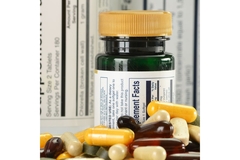CRN adopts new voluntary guidelines for melatonin-containing sleep supplements

17 Apr 2024 --- The Council for Responsible Nutrition (CRN) has updated guidelines for melatonin-containing supplements and gummies to provide recommendations to address intentional overages (excess) during manufacturing, child-deterrent packaging and precautionary label statements. The guidelines aim to ensure that consumers have access to responsibly formulated, labeled and packaged products.
The organization has issued two sets of voluntary guidelines for melatonin-containing products, one focusing on the formulation, labeling and packaging of supplements marketed for sleep support and one for labeling gummy supplements.
“These are just the latest in a series of voluntary guidelines that CRN members have adopted that underscore CRN’s unwavering commitment to the well-being of consumers and the integrity of the dietary supplement market,” says Steve Mister, president and CEO of CRN.

“By setting these high standards, we help our members offer products that are responsibly manufactured and marketed and widely trusted by consumers.”
CRN urges its members and the supplement industry to adopt these guidelines as soon as practicable, providing specific implementation timelines for each set for a smooth transition. The guidelines were recently adopted by the organization’s Board of Directors.
Last year, researchers cautioned that melatonin consumption by US children and adolescents was increasing, based on an online survey of parents. At the time, CRN argued that the research cited irrelevant and flawed data, urging that the study only underscored the popularity of safe products.
Melatonin supplements
CRN’s new guidelines call for cautionary label statements to alert consumers that melatonin may cause drowsiness, urge them not to take the supplements with alcohol and warn them that products are intended for intermittent or occasional use only.
To support safety and stability, the guidelines recommend that any overages of melatonin added during manufacture are informed by data, even though federal regulations require supplements to contain at least 100% of labeled amounts throughout a product’s shelf life.
 CRN urges its members and the supplement industry to adopt these guidelines as soon as practicable.The organization calls for industry members to adopt child deterrent packaging for flavored, chewable product forms containing melatonin that could be especially attractive to children. This provides a tool for parents and caregivers to prevent unsupervised access to these products. Federal regulations do not require child deterrent closures on melatonin-containing products.
CRN urges its members and the supplement industry to adopt these guidelines as soon as practicable.The organization calls for industry members to adopt child deterrent packaging for flavored, chewable product forms containing melatonin that could be especially attractive to children. This provides a tool for parents and caregivers to prevent unsupervised access to these products. Federal regulations do not require child deterrent closures on melatonin-containing products.
CRN asks its members to adopt these guidelines within 18 months.
Gummy labeling and packaging
As gummy supplements are growing in popularity among consumers of all ages, CRN notes that its guidelines specifically address the unique aspects of these products. They focus on labeling clarity, reducing unsupervised access by children, addressing potential choking hazards and ensuring all products are used as intended.
The guidelines include detailed labeling advice for products aimed at adults and children. These detail specific considerations for gummies for young kids and underscore the importance of using these products under appropriate conditions and guidance.
Products intended for children under four should include a precautionary statement that if not chewed properly, the product could present a choking hazard.
CRN asks manufacturers to consider packaging gummy supplements with child deterrent closures in containers. For example, when making packaging choices, evaluate product aspects such as ingredient profiles, serving amounts and total package contents.
The organization asks its members to adopt these guidelines within 24 months.
Sleep support
Extended screen time and geopolitical issues are drivers of stress and sleep disturbances. Meanwhile, consumers increasingly recognize the value of sleep quality through an awareness created by wearable technology.
Recognizing the popularity of alternative supplement formats, US-based Good Day Chocolate offers chocolate supplement pieces for sleep, calmness and energy. The company notes that its core ingredients, such as melatonin, are better absorbed by the body in chocolate.
At the same time, some supplement companies started developing melatonin-free options in response to a growing consumer demand. For example, PharmaLinea’s line of sleep solutions includes formulations with and without melatonin.
Alternatively, a clinical trial on MDBio’s sleep supplement with CBD and botanicals found significant improvements in participants’ sleep quality, anxiety, stress and well-being. The company notes that MDsleep does not contain melatonin as research shows that melatonin “can lead to unpleasant side effects like next-day drowsiness, headaches, dizziness and nausea when used long-term.”
By Jolanda van Hal











